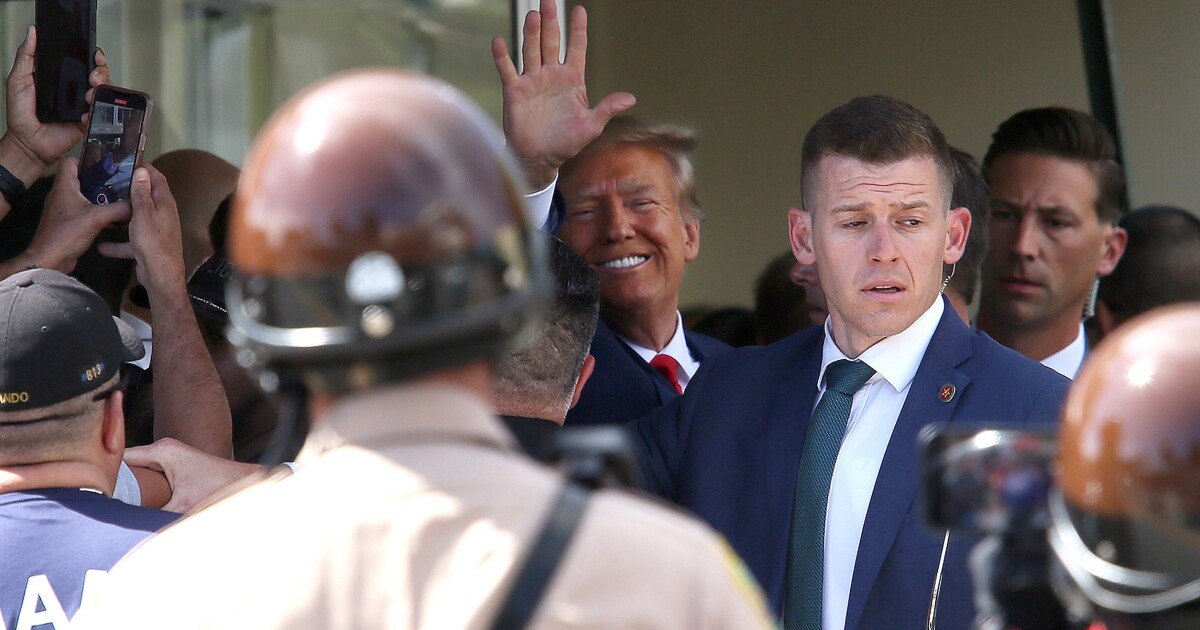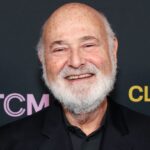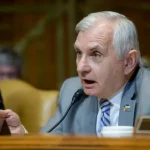

As former President Donald Trump’s legal team prepares a defense that appears to be broadly focused on claims of a double standard, the specifics of the FBI’s decision to raid his home last year could become a key element of their argument.
Trump’s lawyers previewed their case Tuesday when the former appeared in a Miami courtroom for the first time since the Justice Department indicted him on 37 federal counts related to his handling of classified information.
DOCKWORKER TALKS THREATEN BIDEN WITH ANOTHER TOUGH DECISION BETWEEN LABOR AND THE ECONOMY
“The decision to pursue charges against President Trump while turning a blind eye to others is emblematic of the corruption that we have here,” Alina Habba, one of Trump’s attorneys, told reporters outside the courtroom during the proceedings. She cited the cases of Hillary Clinton and President Joe Biden, both of whom mishandled classified documents without facing the raids, secret recordings, or extensive efforts to find witnesses that characterized the investigation of Trump.
Testimony from a top FBI agent at the time of the August 2022 raid of Mar-a-Lago could provide fodder for that argument.
House Judiciary Committee Chairman Jim Jordan (R-OH) for the first time on Friday revealed snippets of transcribed answers provided to the committee by a former FBI official involved with the case.
The House Judiciary Committee conducted a closed-door interview on Wednesday with Steven D’Antuono, the assistant director in charge of the FBI’s Washington field office when the FBI executed a warrant to search Trump’s home.
In his conversation with the committee, D’Antuono detailed the concerns he’d raised last year with Justice Department officials who pushed to handle the raid more aggressively than he felt necessary, according to a letter Jordan sent Friday to Attorney General Merrick Garland.
Among other objections, D’Antuono told the committee that he felt the FBI should have sought consent from Trump’s lawyers before searching Trump’s home, recalling that he felt “there was a good likelihood that [they] could have gotten consent” had they asked before the raid.
Whether Trump’s legal team could use D’Antuono as a witness — or simply the existence of a dispute between FBI line agents and Justice Department higher-ups over the raid, which was first revealed in a Washington Post report in March — as a building block in its construction of a case focused on law enforcement misconduct remains unclear.
A lawyer for Trump did not immediately return a request for comment.
Trump’s legal team remained fluid heading into his arraignment on Tuesday. Todd Blanche, an attorney also representing him in a criminal case brought by the Manhattan district attorney, entered a plea of not guilty on behalf of Trump in the Miami courtroom.
But Trump is struggling to lock down other defense lawyers in Florida, a person familiar with the situation told the Washington Examiner, in part because of the presence of a controversial aide on the team.
Boris Epshteyn has helped drive away other attorneys who’ve left Trump’s service; one, Tim Palatore, said when he left the team last month that he felt Epshteyn had prevented Trump’s attorneys from mounting a stronger defense.
A longtime Trump political aide, Epshteyn has developed a reputation for fierce loyalty to Trump that has, throughout the course of the latest legal battles, sometimes taken the form of shielding his client from uncomfortable truths, according to Epshteyn’s critics.
The difficulty of fighting the charges as detailed by prosecutors could also affect the makeup of Trump’s defense.
In a lengthy indictment document released Friday, special counsel Jack Smith’s lawyers outlined a volume of evidence that included audio recordings of Trump appearing to confirm he’d retained a document he failed to declassify as president, among other pieces of evidence that point to a strong case. However, the discovery process has not yet begun, and legal experts say Trump’s attorneys will have a chance to cast prosecutors’ findings in a different light based on what material they are able to obtain from the government.
Andrew McCarthy, a former U.S. attorney, noted that just because the Justice Department’s approach to the raid was heavy-handed, that does not mean it was against the law.
“They got a judicial search warrant, so there was solid legal basis for the search,” McCarthy told the Washington Examiner. “The fact that they might have been able to use a less aggressive tactic doesn’t mean the tactic they used was illegal.”
“It’s also not clear that if the FBI had asked him to consent to a search, Trump would have agreed,” McCarthy said.
Trump said in a statement after the August 2022 raid that the move was “not necessary or appropriate” because, he said, his team had been “working and cooperating with the relevant government agencies” for months. Trump’s lawyers had indeed spent months going back and forth with the National Archives and the Justice Department over the return of documents that archivists said belonged to the government.
Still, McCarthy noted, objecting to the execution of the raid could bolster the Trump team’s efforts to paint a picture of a politicized Justice Department.
“I think it could help Trump’s overarching claim that he is being subjected to selective, vindictive prosecution by the Biden admin and Biden DOJ,” he said. “But legally, it won’t help him much.”
The Justice Department’s specific evidence for executing an unannounced raid, rather than the consensual searches afforded to Biden after he found classified documents in unauthorized locations, remains unclear.
While the Justice Department unsealed the affidavit supporting the search warrant last year, much of the document was redacted, concealing precisely why officials believed a raid was necessary to prevent disruption to the investigation.
Speaking to the House Judiciary Committee last week, D’Antuono said he raised alarms that the FBI would be “left holding the bag again” if the Justice Department insisted on executing the search warrant without following what he said were standard procedures for such a case.
The former FBI agent, who has since left the bureau for the private sector, testified that the FBI should have followed the lessons it learned from the Russia investigation to avoid the appearance of bias in the classified document case.
D’Antuono told congressional investigators that he had “absolutely no idea” why the decision was made to have the Washington field office — rather than the Miami field office, which had jurisdiction over the territory in which the search warrant was to be executed — called upon to conduct the raid. He said one of the primary lessons the bureau took from the Russia investigation was that more investigations should be handled by field offices rather than through the officials in Washington.
In another arrangement that D’Antuono characterized as a departure from standard procedure, the former FBI agent said he “didn’t understand why there wasn’t a U.S. Attorney assigned” to the case and that he “raised this concern a lot with” the decision to appoint Jay Bratt, a top Justice Department official, as the prosecutor instead.
By contrast, in the investigation of Hunter Biden, the U.S. attorney in Delaware was tasked with overseeing the case rather than officials working in Justice Department headquarters.
Bratt has been accused by the Trump legal team of attempting to extort a lawyer for one of Trump’s aides by inappropriately mentioning the fact that the Trump aide’s lawyer had applied for a judgeship that requires presidential sign-off.
The Trump aide’s lawyer has said he interpreted the mention as a threat to his career prospects if he did not get his client to cooperate with prosecutors.
D’Antuono testified that he also raised concerns, ahead of the raid, that Trump was given no chance to allow a voluntary search and that the FBI worked to exclude Trump’s lawyers from the search process. D’Antuono was overruled by FBI and Justice Department officials who pursued the unannounced raid anyway.
The raid ultimately led to the publication of widely circulated pictures showing classified documents strewn on Mar-a-Lago’s floors and laid the foundation for what has become a serious federal case against Trump.
D’Antuono does not appear to be a Trump partisan, which could help shield him from efforts to discredit him should the dispute over the raid become an issue in the trial.
D’Antuono helped oversee the FBI’s investigation of hundreds of suspects accused of rioting at the Capitol on Jan. 6, 2021.
“Just because you’ve left the D.C. region, you can still expect a knock on the door if we find out that you were part of criminal activity inside the Capitol,” D’Antuono told reporters just days after the violence. “Bottom line: The FBI is not sparing any resources in this investigation.”
Bratt, by contrast, appears to have donated to Democratic groups and campaigns over the years, and his comments about the Trump aide lawyer’s judgeship application appear likely to become a top issue.
CLICK HERE TO READ MORE FROM THE WASHINGTON EXAMINER
Bratt was heavily involved in the case. He and other Justice Department officials visited Mar-a-Lago in June 2022 at the invitation of Trump’s lawyers to discuss the document dispute.
During that visit, Trump’s lawyers voluntarily showed him the storage room the FBI would, two months later, raid. Bratt even emailed Trump’s lawyers later suggesting that they get a stronger lock for the room he was shown, and the team complied, although that did not deter the Justice Department from pushing for the FBI raid.






